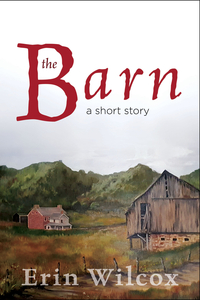Introducing The Barn by Erin Wilcox

November was a sobering reminder of the deep wounds this country carries. The historical trauma that began with colonists fleeing religious persecution in colonial England has been reenacted again and again, in the genocide of Native Americans, the Salem Witch Trials, in prejudice against immigrant populations from the Irish to Chinese to Syrians, in the enslavement of indigenous African people, the Civil War—I could go on.
Raised a Quaker, I believe in radical compassion. It has been difficult, though, to feel compassion in the midst of what feels like a deep betrayal of the liberal creed this country has painstakingly labored toward. I am angry that in a nation with so much institutionalized misogyny, racism, and colonialism we are taking a step backward, moving even farther from liberty and justice for all than we already were on Nov. 7, 2016, when we still had a long way to go. On my more hopeful days, I am able to think of the tide of fear that has swept the country (which the media labels “populism,” though it represents the attitudes of less than half of voting Americans and is therefore a misnomer, despite the word’s agrarian connotations) as pushback that we can still overcome. On other days, the best I can say about this historical moment is that it has drawn a sharper distinction for me between the energy of acting from a wounded, fearful place and acting from a resilient, confident one.
My responses have been manifold, forming coalitions, calling representatives, signing petitions, demonstrating peacefully, staying apprised of increasingly traumatic current events, and producing art. I appreciate the engagement of artists more than ever before, and I’m so glad for every effort I’ve ever made to use my privilege to help others who have less. I’m also glad I wrote a story called “The Barn” years ago, showing compassion for the kind of character who would likely have voted for the current administration, because I don’t think I could write so dispassionately now. I am still too angry, hurt, and appalled. But I think the relative lack of judgment in this piece empowers the reader to see a reflection of our culture and decide what to make of it.
The story is about an old farmer struggling with the same forces that divide our nation: race, class, misogyny, fear, nostalgia, and love—of a certain narrow stripe. No character in the piece is without flaws, and each possesses their own merits. The story was first published in Praxis: Gender and Cultural Critiques in 2012. From the morning of November 9, I knew that the time had come to bring it to a larger audience, as soon as possible, so I created a GoFundMe campaign to raise half the production costs. Any donations made at this point will go toward a modest promotional budget. I am contributing half of all proceeds to the NAACP.
The story was released on January 17 and for several days held its own among the top new releases for thirty-minute quick reads. A sample is available on this site in the fiction portfolio. The entire piece is currently available in the Kindle store. And I have copies in several other e-book formats: please contact me if you’re interested. If you do read the piece, I hope you’ll consider leaving a review on Amazon or Goodreads—all opinions are welcome!